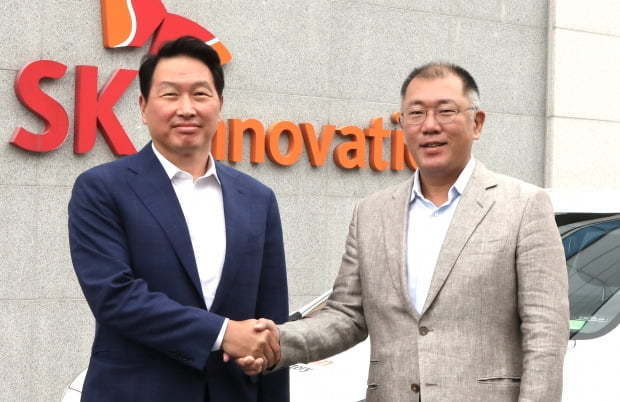SK Innovation battery recycling tech wins US nod
By Kim Byung-wookPublished : March 29, 2021 - 16:57

SK Innovation’s battery recycling technology has been verified by Argonne National Laboratory, a research institute under the US Department of Energy, the company said Monday.
According to SKI, the technology extracts metals inside used-up lithium-ion batteries for electric vehicles. Lithium retrieved with this technology emits 74 percent and 41 percent less greenhouse emissions compared to that produced from mines and salt lakes, respectively, according to Argonne National Laboratory’s life cycle assessment on SKI’s technology.
“This technology will allow us to respond flexibly to global environmental regulations,” said Lee Sung-joon, director of SK Innovation’s Environment Science Technology Center. When lithium is mined at high temperatures, the process emits a great mount of pollutants to the atmosphere including sulfur oxide.
Existing recycling technologies first retrieve other metals -- such as nickel, cobalt and manganese -- then extract lithium after. In this process, lithium is adulterated. However, SKI’s technology takes out lithium first and foremost to maintain its purity.
“Typical recycling technologies recover lithium in the form of lithium carbonate, which is inadequate to reuse for high-nickel batteries. However, SKI’s technology extracts lithium directly in the form of lithium hydroxide, which is suitable for manufacturing high-nickel batteries,” an SKI official said.
To manufacture high-nickel batteries, lithium hydroxide is essential, the official added. The melting point of lithium carbonate is 723 degrees Celsius. However, the manufacturing process of high-nickel batteries doesn’t go up as high as 723 degrees Celsius, which is why high-nickel batteries require lithium hydroxide, which melts at 462 degrees Celsius.
Also, extracting lithium directly in the form of lithium hydroxide can cut costs significantly. Typically, lithium hydroxide is produced by adding catalysts to carbon and letting them react with each other. This additional process drives up the price of lithium hydroxide by about $1 to $2 per kilogram.
The technology is the latest development under a partnership with Hyundai Motor Group, according to SKI.
Last September, SKI signed an agreement with Hyundai Motor and its sister company Kia to together develop an EV battery ecosystem including the reuse and recycling of EV batteries.
However, SKI said immediate commercialization of the technology is unlikely.
“The technology will have to wait as there are insufficient amount of used-up EV batteries in the market and not enough battery recycling infrastructure in Korea,” the SKI official said.
Argonne National Laboratory evaluated SKI’s technology based on a model called GREET, short for greenhouse gases, regulated emissions and energy use in technologies. The model, developed with funding by the US Energy Department, can analyze the life cycle of EV batteries in detail.
Based on the model, Argonne National Laboratory has conducted environmental assessments on global automakers and energy companies including General Motor, Ford, Chrysler, ExxonMobil, Shell and BP. The state of California is expected to utilize the model to draw up its carbon regulations for automobiles.
By Kim Byung-wook (kbw@heraldcorp.com)







![[KH Explains] Hyundai's full hybrid edge to pay off amid slow transition to pure EVs](http://res.heraldm.com/phpwas/restmb_idxmake.php?idx=644&simg=/content/image/2024/04/18/20240418050645_0.jpg&u=20240419100350)






![[From the Scene] Monks, Buddhists hail return of remains of Buddhas](http://res.heraldm.com/phpwas/restmb_idxmake.php?idx=652&simg=/content/image/2024/04/19/20240419050617_0.jpg&u=20240419175937)

![[KH Explains] Hyundai's full hybrid edge to pay off amid slow transition to pure EVs](http://res.heraldm.com/phpwas/restmb_idxmake.php?idx=652&simg=/content/image/2024/04/18/20240418050645_0.jpg&u=20240419100350)

![[Today’s K-pop] Illit drops debut single remix](http://res.heraldm.com/phpwas/restmb_idxmake.php?idx=642&simg=/content/image/2024/04/19/20240419050612_0.jpg&u=)